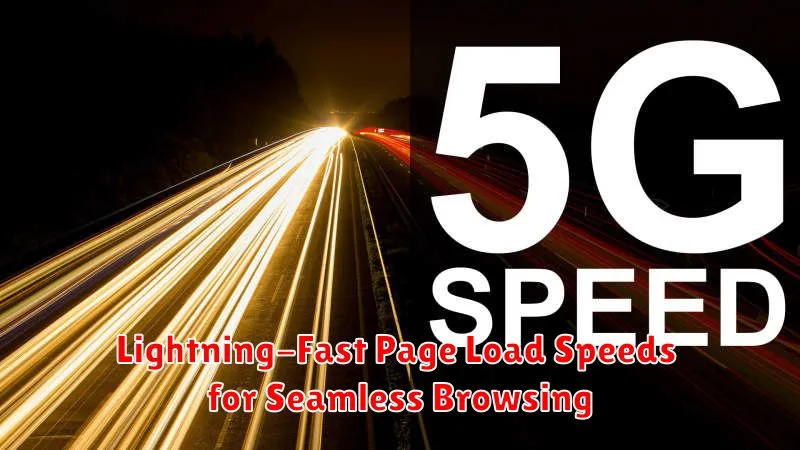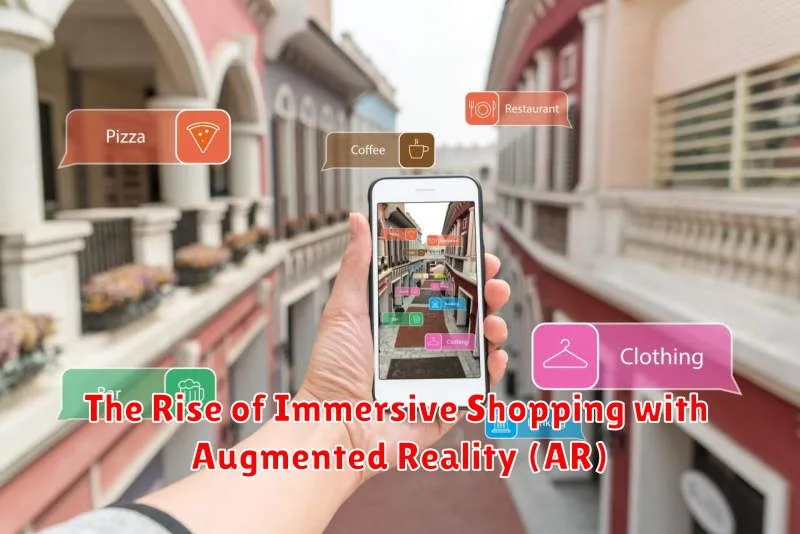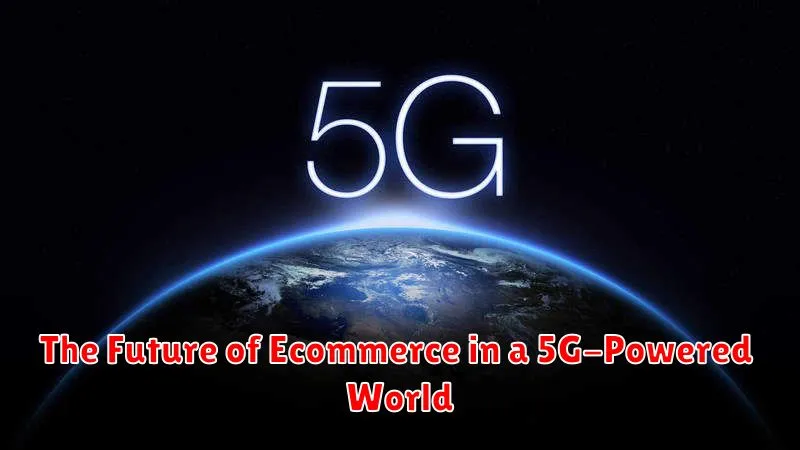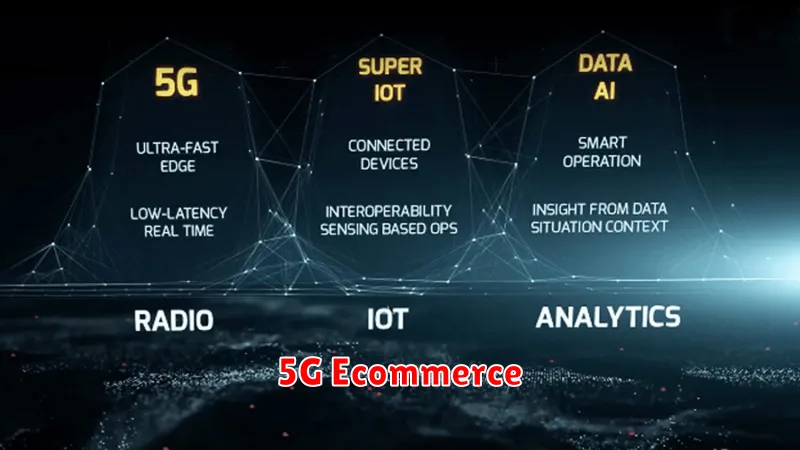The world of technology is constantly evolving, with new advancements emerging at an unprecedented pace. One of the most significant breakthroughs in recent years is the advent of 5G, the next generation of wireless technology. With its lightning-fast speeds, ultra-low latency, and unparalleled connectivity, 5G is set to revolutionize a wide range of industries, and e-commerce is no exception. This game-changing technology promises to transform the way businesses operate and consumers shop, ushering in a new era of digital commerce.
The impact of 5G on e-commerce is profound and multifaceted. From empowering immersive shopping experiences to streamlining logistics and supply chains, the possibilities are vast. This article will delve into the key ways 5G will reshape the e-commerce landscape, exploring the exciting opportunities and challenges that lie ahead. Prepare to be amazed by the transformative power of this revolutionary technology.
Understanding the Fundamentals of 5G Technology
The 5G revolution is upon us, promising to transform the way we live, work, and interact with the world. But what exactly is 5G and why is it such a game-changer? 5G stands for fifth-generation wireless technology, representing the latest generation of cellular networks that will replace existing 4G networks. It’s essentially a leap forward in mobile internet connectivity, offering significantly enhanced speeds, latency, and network capacity.
Think of 5G as a superhighway for data. Unlike 4G, which is like a regular highway with limited lanes, 5G boasts many more lanes, enabling data to travel at much higher speeds and with less congestion. This results in faster download and upload speeds, reduced latency (the time it takes for data to travel from your device to the network and back), and greater capacity to accommodate more connected devices.
Here are some of the key characteristics of 5G technology that make it so revolutionary:
- Higher speeds: 5G networks are capable of achieving download speeds up to 10 times faster than 4G networks. This means you can download large files, stream high-definition video, and play online games with minimal buffering or lag.
- Lower latency: 5G reduces the delay between sending and receiving data, making real-time applications like online gaming, video conferencing, and remote surgery much smoother and more responsive.
- Increased capacity: 5G networks can support a significantly larger number of devices simultaneously, making it ideal for the Internet of Things (IoT) where billions of devices will be connected to the internet.
The potential of 5G goes far beyond faster internet speeds. It’s a technology that will underpin numerous advancements in areas like artificial intelligence, autonomous driving, virtual reality, and the internet of things. 5G is not just about faster downloads; it’s about unlocking a new era of possibilities and innovation.
5G’s Impact on E-commerce: A Paradigm Shift
The arrival of 5G is not just an upgrade in internet speed; it’s a complete overhaul of the digital landscape. This transformative technology is poised to revolutionize e-commerce, ushering in a new era of enhanced customer experiences and unprecedented business possibilities.
5G’s lightning-fast speeds and low latency unlock a realm of possibilities previously unimaginable. Imagine browsing through virtual showrooms with lifelike realism, using augmented reality to visualize products in your own home, or placing orders with instant confirmation. These are just a few examples of how 5G will redefine the e-commerce experience, creating a seamless and intuitive online shopping journey.
5G’s Impact on E-commerce: A Paradigm Shift
The impact of 5G on e-commerce goes far beyond enhanced user experiences. It will reshape the entire industry, empowering businesses to:
- Offer personalized and interactive experiences: 5G will enable retailers to tailor products and promotions to individual customer preferences, delivering highly personalized shopping experiences through AI-powered recommendations and interactive AR/VR applications.
- Embrace real-time inventory tracking: The ultra-reliable connectivity of 5G will allow retailers to track inventory in real time, eliminating stockouts and ensuring smoother fulfillment processes.
- Facilitate frictionless payments: 5G will accelerate the adoption of mobile payments, creating secure and convenient checkout experiences with near-instant transactions.
- Unlock the potential of the Internet of Things (IoT): 5G will connect smart devices, enabling businesses to optimize logistics, track deliveries, and automate warehouse operations.
In conclusion, 5G’s impact on e-commerce will be profound and transformative. The technology will empower businesses to redefine customer experiences, enhance operational efficiency, and unlock new revenue streams. As we navigate this exciting new era of digital commerce, businesses that embrace the power of 5G will be best positioned to thrive in the evolving marketplace.
Lightning-Fast Page Load Speeds for Seamless Browsing

One of the most significant impacts of 5G on e-commerce is its ability to dramatically improve page load speeds. With 5G’s ultra-fast data transfer rates, websites and apps will load almost instantly, creating a truly seamless browsing experience. This is a game-changer for online shoppers, who are increasingly demanding fast and efficient experiences.
Imagine browsing through a vast online store, effortlessly scrolling through product pages, and instantly zooming in on images without any lag. 5G will make this a reality, eliminating the frustration of waiting for pages to load and enhancing user engagement.
The faster loading times enabled by 5G will also benefit e-commerce businesses in numerous ways. They can now offer rich media experiences, such as high-resolution videos and interactive product demos, without compromising loading speeds. This can lead to improved customer engagement, higher conversion rates, and increased sales.
Enhanced Mobile Shopping Experiences
The advent of 5G technology is poised to revolutionize mobile shopping experiences, delivering unparalleled speed, responsiveness, and immersive engagement. With blazing-fast download speeds and minimal latency, 5G will empower consumers to browse products, make purchases, and interact with brands in a way that was previously unimaginable.
Augmented Reality (AR) and Virtual Reality (VR) will become central to mobile shopping, allowing customers to virtually try on clothes, visualize furniture in their homes, or explore product details in an interactive 3D environment. This immersive experience will bridge the gap between the physical and digital worlds, enhancing product discovery and purchase decisions.
Live Shopping and Personalized Recommendations will also flourish. 5G’s high bandwidth will facilitate real-time video streaming, enabling live shopping events with interactive elements. Personalization will reach new heights, with retailers leveraging AI-powered algorithms and user data to deliver hyper-relevant product recommendations and offers, tailored to individual preferences and shopping habits.
Mobile payments will become seamless and secure, with 5G enabling faster transaction processing and enhanced security features. Consumers will be able to make purchases quickly and easily, without the need for traditional payment methods.
In conclusion, 5G is set to unlock a new era of mobile shopping, transforming it from a passive activity into an immersive and engaging experience. By seamlessly integrating AR/VR, live shopping, personalized recommendations, and enhanced mobile payments, 5G will empower businesses to create frictionless and personalized shopping experiences that cater to the evolving needs of today’s digitally-savvy consumers.
The Rise of Immersive Shopping with Augmented Reality (AR)

The rise of 5G has opened a new era of possibilities for the retail industry. One of the most exciting developments is the emergence of immersive shopping experiences powered by augmented reality (AR). AR has the potential to revolutionize how we shop by bringing products to life right in front of our eyes.
Imagine trying on clothes virtually without leaving your home or visualizing how a new sofa would fit in your living room before purchasing it. This is the power of AR. By superimposing digital images onto the real world through our smartphones or tablets, AR allows shoppers to interact with products in a more engaging and realistic way.
AR is not just about visual enhancements. It can also be used to provide real-time information about products, such as price comparisons, customer reviews, and product specifications. This creates a more personalized and informed shopping experience. AR is already making waves in the retail industry, with brands like Ikea, Sephora, and Nike using it to enhance their customer experiences.
As 5G networks become more widespread, AR is expected to become even more prevalent in e-commerce. The high bandwidth and low latency of 5G will enable faster loading times and more realistic AR experiences, making it easier for consumers to adopt this technology. The future of shopping is immersive, and AR is set to be at the forefront of this exciting evolution.
Real-Time Inventory Tracking and Management
One of the most significant impacts of 5G on e-commerce is the revolutionizing of real-time inventory tracking and management. With 5G’s ultra-low latency and high bandwidth, businesses can gain instant access to accurate and up-to-the-minute information about their inventory levels across multiple locations.
This real-time visibility eliminates the lag between physical stock and online inventory, enabling businesses to provide customers with accurate information about product availability. Consequently, it reduces instances of overselling and stockouts, leading to increased customer satisfaction and loyalty.
Moreover, 5G facilitates the adoption of technologies like Radio Frequency Identification (RFID) and Internet of Things (IoT) sensors. These technologies enable continuous monitoring of inventory movement, providing insights into stock flow, demand patterns, and potential bottlenecks. This data-driven approach allows businesses to optimize their inventory management strategies, leading to reduced holding costs and improved efficiency.
Furthermore, 5G-powered predictive analytics can analyze historical data and real-time inventory levels to forecast future demand. This capability enables businesses to proactively adjust inventory levels, ensuring they have the right products in the right quantities at the right time. This reduces stockouts and minimizes waste, leading to significant cost savings and increased profitability.
Improved Customer Service with Instantaneous Interactions
5G technology’s rapid speed and low latency will revolutionize customer service in e-commerce, ushering in a new era of instantaneous interactions. This will mean a faster and more seamless experience for customers, leading to higher satisfaction and loyalty. With 5G, customer service representatives will be able to instantly access information about a customer’s order history, past interactions, and preferences, enabling them to provide personalized and efficient assistance.
This instantaneous access to information will empower customer service agents to resolve issues quickly and efficiently. Imagine a customer facing a problem with their online order. With 5G, the agent can access real-time information about the order’s status, shipping details, and any potential issues, allowing them to address the problem in a matter of seconds.
Furthermore, 5G will enable the use of advanced technologies like augmented reality (AR) and virtual reality (VR) to enhance customer service. Imagine a customer seeking assistance with assembling a piece of furniture. With AR, a customer service agent could remotely guide the customer through the assembly process, providing real-time instructions and visual aids.
The potential of 5G for improving customer service is undeniable. By providing faster, more efficient, and personalized interactions, e-commerce businesses can build stronger customer relationships and create a more positive shopping experience. This will be key to staying competitive in the ever-evolving world of online commerce.
Location-Based Marketing and Personalized Recommendations
5G technology isn’t just about faster internet speeds. It’s about changing how we interact with the world around us. This game-changing technology will usher in a new era of hyper-personalized experiences, thanks to its ability to deliver low latency and massive data processing capabilities. For e-commerce, this means location-based marketing and personalized recommendations will reach a whole new level of sophistication.
Imagine walking down the street and receiving a notification on your phone about a sale at a nearby store you’ve been meaning to visit. Or being presented with personalized product recommendations based on your real-time location and browsing history. This is the power of 5G-enabled location-based marketing. By leveraging location data, businesses can target consumers with highly relevant offers, ensuring their messages land at the right time and place.
Furthermore, 5G’s ability to handle vast amounts of data will enable highly personalized recommendations. With access to real-time location data, browsing history, and purchase patterns, e-commerce platforms can create incredibly detailed profiles of their customers. This allows them to offer recommendations tailored to individual preferences, increasing customer satisfaction and driving conversions.
The possibilities for location-based marketing and personalized recommendations in a 5G world are truly limitless. As the technology continues to develop and become more widely adopted, expect to see a significant shift in how businesses engage with their customers. This new era will be marked by personalized, contextualized, and hyper-relevant experiences that will revolutionize the way we shop and interact with brands.
The Future of Ecommerce in a 5G-Powered World

The arrival of 5G is poised to revolutionize the e-commerce landscape, unlocking a world of possibilities and transforming the way we shop. This game-changing technology promises blazing-fast speeds, ultra-low latency, and massive connectivity, creating a foundation for a truly immersive and frictionless online shopping experience.
With 5G, online retailers can deliver instantaneous product information, interactive 3D product visualizations, and real-time inventory updates, empowering customers to make informed decisions with ease. Imagine browsing a virtual showroom where you can virtually try on clothes, explore furniture in your living room, or receive personalized product recommendations tailored to your preferences, all without any lag or delays.
The enhanced connectivity enabled by 5G will also revolutionize the delivery experience. With the ability to track shipments in real-time, customers can receive instantaneous delivery updates and estimated arrival times. This will lead to increased transparency, reduced anxiety, and ultimately, greater customer satisfaction.
Furthermore, 5G will pave the way for new and innovative e-commerce models. The emergence of augmented reality (AR) and virtual reality (VR) shopping experiences will blur the lines between the physical and digital worlds. Customers can step into virtual stores, interact with products in 3D, and even try before they buy, all from the comfort of their own homes.
The 5G revolution will undoubtedly reshape the e-commerce landscape, creating a more connected, immersive, and personalized shopping experience. As we embrace this new era of connectivity, we can expect to see an explosion of innovation and a shift in the way we consume and interact with products and brands.
Challenges and Opportunities for Ecommerce Businesses in the 5G Era
The advent of 5G technology is poised to significantly disrupt the e-commerce landscape, presenting both exciting opportunities and formidable challenges for businesses. Faster speeds, reduced latency, and increased bandwidth are game-changers that will revolutionize how consumers interact with online platforms and how businesses operate.
One significant opportunity is the emergence of augmented reality (AR) and virtual reality (VR) shopping experiences. 5G’s capabilities will enable immersive and interactive online shopping, allowing customers to virtually try on clothes, examine furniture in their homes, or even take virtual tours of physical stores. This will enhance the shopping experience, leading to increased customer engagement and satisfaction.
However, businesses need to be prepared for the challenges that come with this technological shift. Data security is paramount, as 5G’s increased connectivity and data flow present new vulnerabilities for cyberattacks. Businesses must invest in robust security measures to protect sensitive customer information.
Another challenge is the need for businesses to adapt their infrastructure and operations to leverage the benefits of 5G. Upgrading existing systems and implementing new technologies to support 5G applications will require significant investments and resources. Furthermore, businesses need to ensure their websites and platforms are optimized for 5G speeds and reduced latency.
The 5G revolution presents a double-edged sword for e-commerce businesses. While it offers incredible opportunities to enhance customer experiences and drive sales, it also poses significant challenges that require careful planning and investment. Those who embrace the opportunities and effectively navigate the challenges will be well-positioned to thrive in the 5G era.

